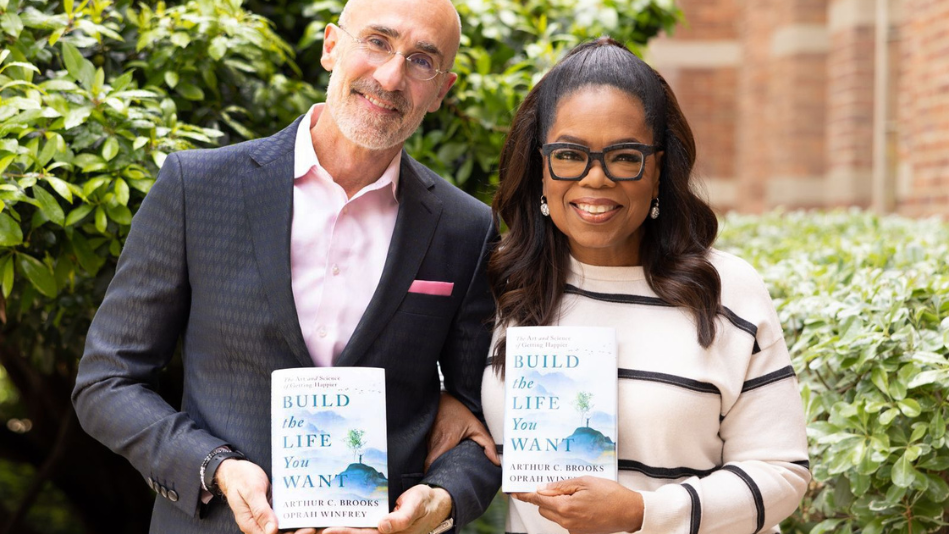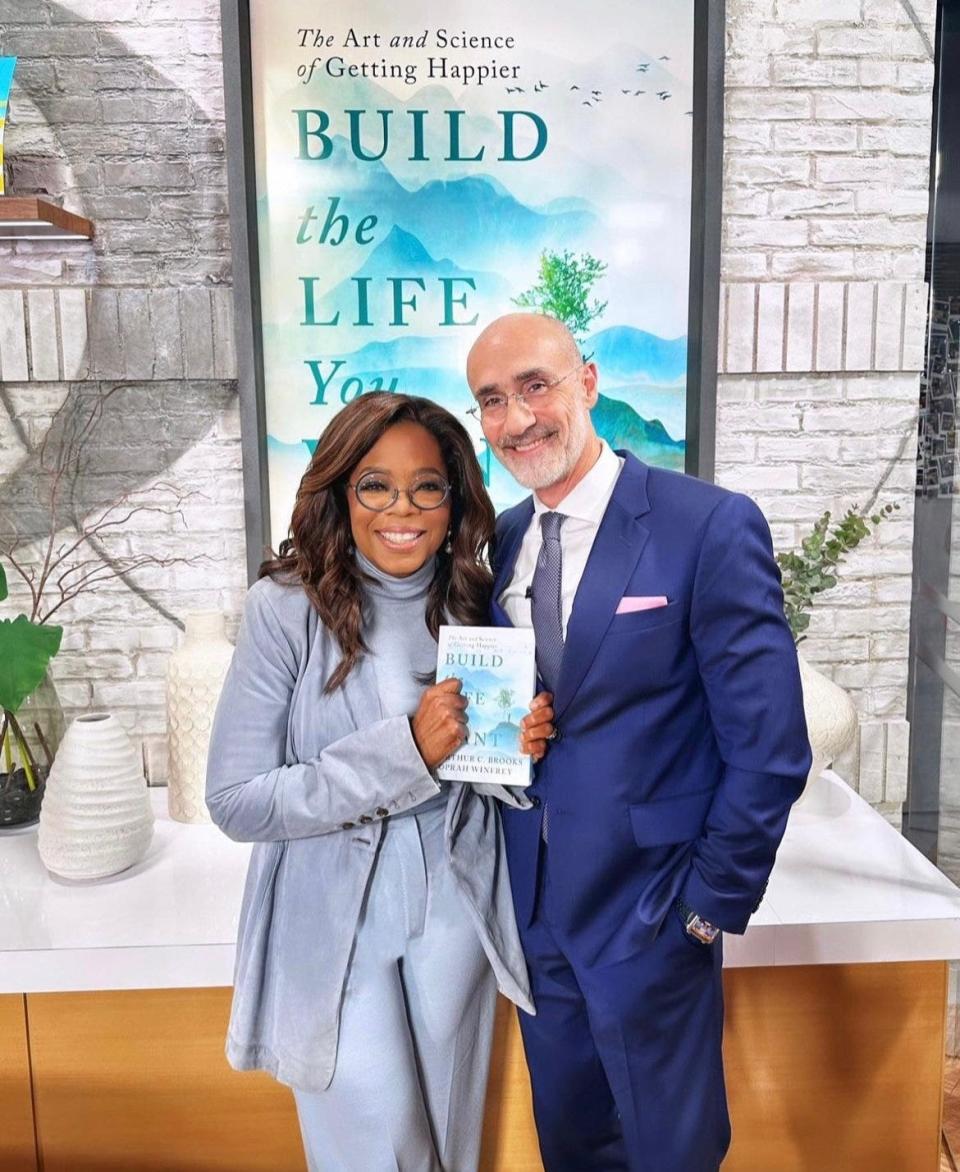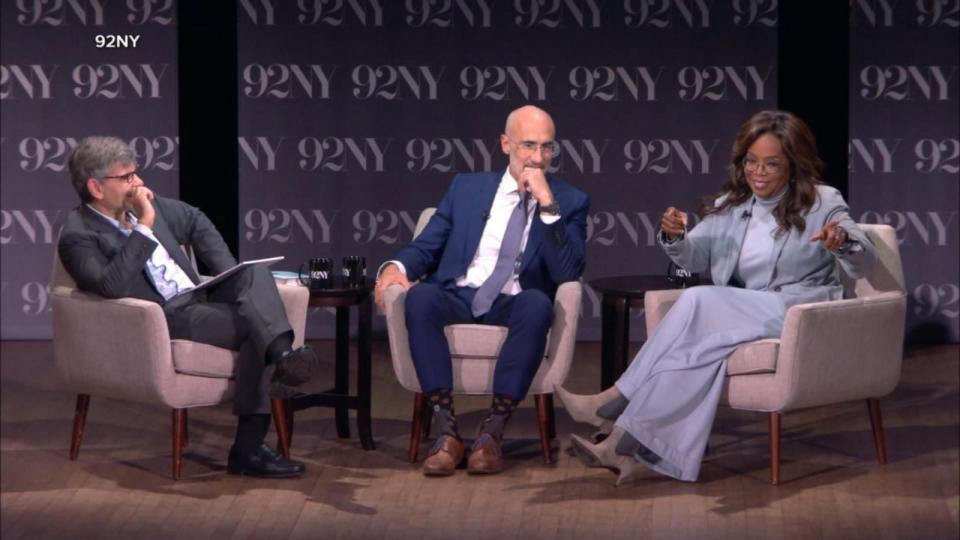Oprah and Harvard prof write science-based book on happiness and getting more of it
- Oops!Something went wrong.Please try again later.
Oprah Winfrey may have ended her eponymous talk show a dozen years ago — but she’s still doing everything she can to make the world a better place.
In August, after wildfires devastated parts of Maui — where Winfrey owns a home — she and Dwayne "The Rock" Johnson teamed up to create the People’s Fund. The goal of the fund is to financially help people whose lives have been shattered via direct payments of $1,200 made to anyone 18 and older who is eligible.
The pair — who launched the fund with a $10 million contribution of their own — said in a statement that by working “closely with an esteemed advisory board and support from the local community and respected elders, this new fund will serve as a bridge to provide cash directly to the families and individuals affected so that they can personally determine how best to use the funds for themselves.”
And last month, Winfrey and co-author Arthur C. Brooks released a wellness book, “Build the Life You Want: The Art and Science of Getting Happier,” that’s certain to be a best-seller among her tens of millions of fans worldwide.
More celebrity Health Matters: What you need to know about the rare form of skin cancer that killed Jimmy Buffett
Pandemic partnership: Oprah and the happiness expert
As People magazine detailed last month, Winfrey first became familiar with the work of Brooks during the early days of the pandemic when she began reading his monthly “How to Build a Life” column in The Atlantic magazine.
Brooks, a Harvard professor, is a social scientist who specializes in happiness. He’s also a best-selling author and hosts the podcast "Cracking the Code to Happiness."
“When I started studying happiness 25 years ago as a PhD student, I didn’t know if academic knowledge would help. I feared that happiness wasn’t something you could change in a meaningful way,” he wrote in promotion of the book.
Brooks, 59, spent most of his career as a corporate executive — but decided to change his life at 55 because he felt he wasn’t maximizing his own happiness.

“I quit my chief executive job, with a plan to write, speak, and teach about the science of happiness. I started by creating a simple personal mission statement for myself,” he wrote. “I dedicate my work to lifting people up and bringing them together, in bonds of love and happiness, using science and ideas.”
The science of happiness
Brooks’ research has shown him there are more than just emotions that determine happiness. There’s some science involved too.
He breaks it down like this: “Something like 25% of your happiness is due to your circumstances and these can change. Around 50% of your baseline happiness levels are genetic. The last 25% or so, depending on the study you’re looking at, are your habits.”
In Brooks’ writings and teachings on the subject, he cites four pillars we should all prioritize: family, friendship, work and faith.
Brooks’ approach resonated with Winfrey.
“For me, it was reaffirmation that how I was moving through my life with the basic pillars of family, friendship, work and faith,” she told People. “Having the scientist sign off on that, it was just reassuring to me. Because I am one of the happiest people I know, but not in the same way that most people would expect. By that, I mean I live a big life, but it's the simplest things that bring me the greatest joy.”
Happiness requires effort — and a plan
So how do the co-authors try to maximize their own happiness?
Winfrey cites her lifelong journaling and practicing gratitude.
“Gratitude has always been my core. To have that backed up and reinforced by Arthur and his scientific research was really, really meaningful to me. I've been journaling since I was 15 … [and] I always end with the five things that I'm grateful for.”

After a speech earlier this year at the University of Utah, Brooks explained to The Salt Lake Tribune his day-to-day strategy for trying to be happy: “You need to maintain a protocol, where your life is sufficiently open to the things that make you happy. There’s a distinction between happiness and unhappiness, which aren’t opposites. Unhappiness is processed in a different hemisphere of the brain.
"For managing my happiness I’m [working on] my relationships with God, my family and friends. To moderate my unhappiness I start every morning when I’m home by getting up at 5 o’clock in the morning and working out for an hour. Then I go to Mass. I have coffee, which is very important to moderating my unhappiness. Then I have three uninterrupted hours of deep work. It’s uninterrupted by devices, by meetings or by people. So it’s wake, prayer, exercise, mass, coffee, then three hours of work.”
Getting and being better friends
Earlier this year, Harvard researchers released the findings of a happiness study that started in … 1938!
The researchers gathered health records from 724 worldwide participants and asked detailed questions about their lives at two-year intervals.
Contrary to what you might expect, it wasn’t career achievement, financial wealth, healthy diet and/or exercise habits that lead to long and happy lives.
Rather, the most consistent finding was that “positive relationships” were the most important factor.

When Brooks was promoting the book on MSNBC, he offered these tips for developing great relationships and achieving healthy friendship “balance”:
Have regular check-ins with your friends: “You should talk on the phone to at least one friend every day.”
Ask deep questions to gauge people’s true opinions on important topics to build upon friendships with acquaintances. This is more than perfunctory small talk — this should be meaningful talk.
Make more friends that “you don’t need.” By that Brooks means that you don’t derive any transactional benefit from this person. Rather, you just enjoy being with him or her.
Winfrey and Brooks are not Pollyannish when it comes to happiness.
When Winfrey struggles to fill out her daily gratitude list, she reminds herself to “go back to your breath. Because if you’re breathing, you ought to be grateful.”
Brooks admits that “I still have plenty of bad days, and I have a long way to go, but today I am comfortable with my bad days, and I know how to grow from them. I know rough times will come, but I’m not afraid of them.”
And that’s why Brooks wants everyone to embrace the process of trying to maximize their happiness because, as he told MSNBC: “Happiness is a direction, not a destination.”
This article originally appeared on Palm Beach Post: Harvard prof, Oprah pen The Art and Science of Getting Happier

